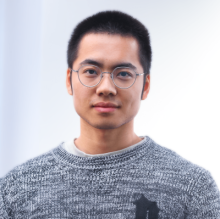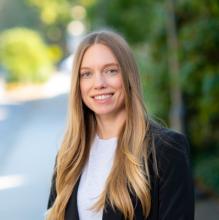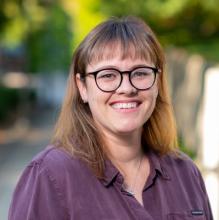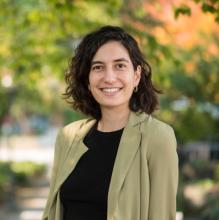A Founder and past-student director of the UBC Climate Hub, Grace is a multiple-award winning scholar and lawyer whose passion on climate emergency work has already resulted in three published novels: the hopeful climate fantasy series Ava of the Gaia trilogy. As part of the PSI, Grace will turn her expertise in creating a new novel that will challenge and counter the false narratives seeded by fossil-fuel industry discourses.
“I am relentlessly practical when it comes to climate change. Scientists have said we have three years to peak global greenhouse gas emissions or we risk climate catastrophe. I carry that timeline in my head and in my heart every day, and I think about what I can do to make it better.”
Outside of her scholarship, Nosek spends a lot of time volunteering on climate projects, including the Climate Hub, a new initiative started by a group of students under the UBC Sustainability Collective to work on environmental justice issues. UBC President Santa J. Ono recently pledged $25,000 to support the creation of the hub.
Nosek is also committed to finding ways of disseminate what she’s learnt. “I have the privilege of learning all of these amazing things and I want to make sure it’s accessible to a wider audience,” she said. “I know that maybe 300 or 400 people will read a Law Review article that I write, if I’m lucky. We just need to be reaching so many more people on climate change and making them feel hopeful and that this is their fight.”
Research Description
Writing a novel is essential to my PhD work: from my research I know how insidious, protean, and powerful fossil fuel industry narratives are, and I also know the most politically and psychologically effective ways to challenge those narratives. They cannot be countered by research alone, which is why my novel is such a critical part of the praxis and scholarship of my doctoral work. I hypothesize that creating an engaging fictional work for a broad audience will spark important conversations about who has shaped our public narratives of climate change; indeed, based on scholarly work, I believe such storytelling may be the only way to prompt such widespread public and scholarly dialogue. I’ll draw from feminist legal theory that stories shape the legal underpinnings of societies in fundamentally important ways, and that new stories can thus challenge those norms. My fictional work will draw from legal research, as well as other disciplines, including history, ecology, and forestry, challenging both scholarly orthodoxy and fossil fuel industry manufactured uncertainty.
What does being a Public Scholar mean to you?
I have the privilege of learning all of these amazing things and I want to make sure they’re accessible to a wider audience. I know that maybe 300 or 400 people will read a law review article that I write, if I’m lucky. We need to be reaching so many more people on climate justice and making them feel hopeful and that this is their fight.
In what ways do you think the PhD experience can be re-imagined with the Public Scholars Initiative?
My research feeds my climate advocacy, and then my climate advocacy gives me immense energy and inspiration to keep doing my research. A PhD is a long, hard road, and students can sometimes lose sight of the meaning behind their work through that slog. I think the Public Scholars Initiative can re-center that sense of meaning and purpose for students while creating wonderful dividends for the public good.
How do you envision connecting your PhD work with broader career possibilities?
I’ve found my professional home at the conjunction of law, story, and democracy. This project will allow me to hone my storytelling in profound and joyful ways.
How does your research engage with the larger community and social partners?
I am already reaching out to various academic, non-profit, and community partners to strategize about how to reach as many people as possible with this project, and how to do so in the most reciprocal, empowering way. I’m hoping this story reaches tens of thousands of people, giving them access to my research!
Why did you decide to pursue a graduate degree?
I wanted to learn more about how we got where we are on climate change, and how law might be able to shift where we’re going. And then I wanted to be able to share that story as broadly as possible. I thought graduate school would equip me with the time, knowledge, support, and tools to do that.
Why did you choose to come to British Columbia and study at UBC?
I’m originally from the east coast of the United States, so I’m pretty far from home. After doing a Fulbright fellowship with the Environmental Law Centre at the University of Victoria I fell in love with this coast and with the community of people working for climate justice along the coast. Through that experience, I met some of the wonderful professors I now work with at UBC, and getting a graduate degree here seemed like a natural next step.
What is it specifically, that your program offers, that attracted you?
UBC is the ideal place to pursue my graduate research because my research draws heavily on the work of my supervisor, Joel Bakan, professor at the Peter A. Allard School of Law. My research project is uniquely situated at the intersection of environmental, corporate, and freedom of expression jurisprudence, all of which are areas of expertise for the Allard School of Law faculty.
For you, what was the best surprise about graduate life, about UBC or life in Vancouver?
There have been many wonderful surprises. Something that has brought a lot of joy and meaning to life in Vancouver is organizing around climate justice with the UBC Sustainability Collective. Working with undergraduate and graduate students from across disciplines to advance climate action at UBC and beyond has been profoundly energizing. After months of work and thousands of hours of preparation, the Collective received seed funding from President Ono to create a Climate Hub at UBC. The Hub will connect and amplify climate initiatives within the university and in the broader community.
What do you like to do for fun or relaxation?
I say hello to the ocean every day, rain or shine. As I mentioned above, I’ve never met a dance party I didn’t want to join. And I write. I just finished the last book in the Ava of the Gaia trilogy—hopeful climate fantasy for readers of all ages!
Do you have any tips for students from your home country coming to Canada / to UBC Grad School?
My general approach to grad school has been to find community, be kind to myself and others, and never say no to a dance party.




